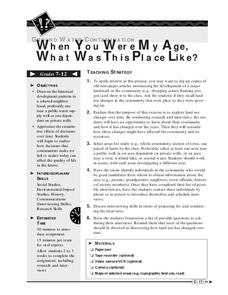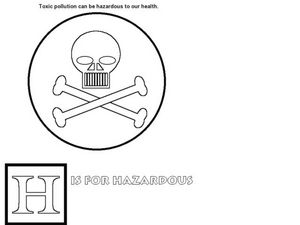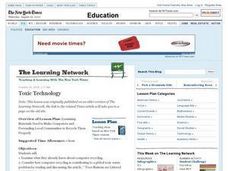Curated OER
Consider The Source
Students learn about the largest natural and human sources of air pollution to become aware of these components in their surrounding environment. In this environmental lesson plan, students read and describe natural sources of air...
Curated OER
Indoor Air: What's the Matter?
Students develop a greater awareness of the variety and amount of particulate matter in the air. They try to locate general sources of pollution for a specific area and develop some suggestions for improving air quality.
Curated OER
Movement of Air Mind Map Activity
Young scholars explore the movement of air. In this air lesson, students discuss and give examples of air ventilation. Young scholars compare outdoor and indoor air quality. Students create mind maps as a visual representation of what...
Curated OER
When You Were My Age, What Was This Place Like?
Students discover how land use in their community has changed. In this community and ecology lesson, students scan old newspapers to find articles about the development of community land. Students discuss and predict how land use has...
Curated OER
Isn't It Ionic?
Students research the properties and health risks of organic chemical solvents. They create a Safety with Solvents newsletter to share with others in their school and community.
Curated OER
Mini-Unit: Natural Resources
Students explore how their choices affect others. In this character development and ecology activity, students debate choice-making issues. Students listen to The Lorax by Dr. Seuss and identify choices the characters made about tree...
Curated OER
Watershed Protection
Students explore environmental care by participating in an Earth science activity. In this clean water lesson, students discuss what a watershed is, how they become polluted, and how it affects the overall quality of drinking water....
Curated OER
Death by Particles
Emerging epidemiologists define relative risk and read an article about the effect of particulate pollution on the cardiovascular health of women. They record the relative risk values, graph them, and answer analysis questions. This is a...
Curated OER
Benefits of Indoor Plants
Students diagram a plant. In this Science instructional activity, students explore the concept of photosynthesis focusing on the oxygen production. Students calculate the amount of plants needed to filter the air in their classroom.
Curated OER
Nutrition: It's In Your Hands
Fourth graders use this lesson to focus on their health, nutrition and the state of the environment. In groups, they examine the various types of land, water and air pollutants and compare and contrast a food chain with and without a...
Curated OER
Reduce Reuse Recycle
Students discover methods that can save the planet by recycling. In this sustainable planet lesson, students read The Berenstein Bears Don't Pollute Anymore, and practice memorizing the 3 R's. Students write commitment letters...
Curated OER
What is the Risk?
Students investigate the 1950's pollution tragedy in Minamata, Japan. The elements of dose, response, individual susceptibility, potency, and threshold of toxicology are explored in this lesson.
Curated OER
Environmental Health Hazards and Children
Students are introduced to the environmental hazards their community is facing. In groups, they develop a list of the ways humans have changed the Earth and how these changes have lead to environmental hazards. They record their...
Curated OER
The Atrazine Dilemma
Students understand how farming practices and the topography of a region can effect the health and safety of all living things. Students play a game which helps them understand how the chemical Azatrine has spread in the watershed.
Curated OER
How Much Azatrine?
Students understand the connections among people, places, and environments in the local school and community, Kansas and its surrounding states, the U.S. and its region, and the world.
Curated OER
Litter Recognition
Students identify litter, and discuss what to do with it. They analyze people's response to litter. Some people may ignore it, while others may pick it up. They observe student behavior as part of an experiment.
Curated OER
Building a Healthy City (Final Project)
Learners construct a scaled model of a city that provides for the economic and cultural needs of a community while maintaining high quality air and water to protect the public health. They articulate, in a presentation, the locations of...
Curated OER
H is for Hazardous
In this toxic materials worksheet, students read the sentence about toxic pollution. Kids then may color the picture of the skull and crossbones. Students color and read 'H is for Hazardous.'
Curated OER
Take a Ride in Honor of National Bike Month
Tap into the joy of bicycling with these suggestions to make a celebration of National Bike Month a blast.
Curated OER
Air, Air Everywhere! Lesson 2: Acid Rain
Middle school environmentalists record the pH of four different liquids, including two aerosol cleaning products. They liken the products to acid rain and speculate in writing which might affect the human respiratory system. Although...
Curated OER
Webquest: Eradicating Guinea Worm Disease in Ghana
Students examine the impact of Guinea Worm Disease. In this world issues activity, students take on the roles of Peace Corps Volunteers. Students will apply their knowledge of the Guinea worm life cycle to create a plan for eradicating...
Curated OER
Contaminated Drinking Water
Students predict, experiment, and draw conclusions about the safety of drinking water. In this ecology lesson, students participate in an experiment to determine if they can taste or see contamination in drinking water. Data is collected...
Curated OER
Breaking News English: Cycling
For this cycling worksheet, learners read the article, answer true and false questions, complete synonym matching, complete phrase matching, complete a gap fill, answer short answer questions, answer discussion questions, write, and more...
Curated OER
TOXIC TECHNOLOGY
Students examine what they already know about computer recycling and cconsider how computer recycling is contributing to a global toxic waste problem by reading and discussing the article, ""Poor Nations are Littered With Old PC's,...
Other popular searches
- Water Pollution
- Air Pollution
- Water Pollution Worksheets
- Air Quality
- Water Pollution Experiments
- Ocean Pollution
- Air Pollution Experiments
- Noise Pollution
- Air and Water Pollution
- Sources of Water Pollution
- Ground Water Pollution
- Fresh Water Pollution

























